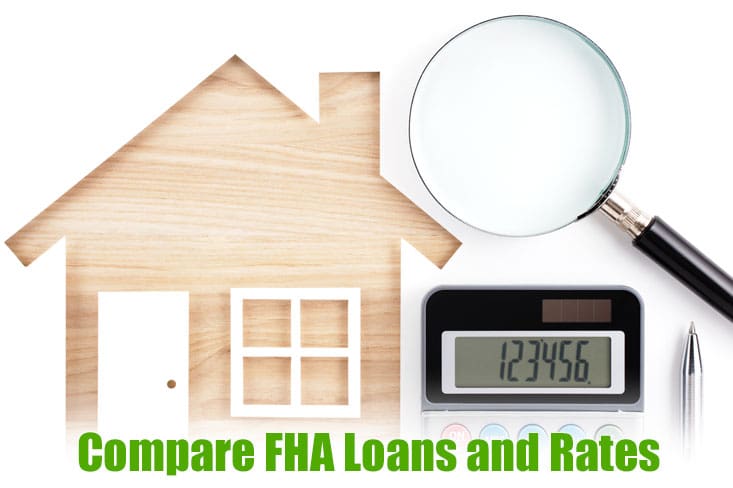The Department of Housing and Urban Development recently updated the Debt to Income rules and income requirements for FHA loans. For over eighty years the Federal Housing Administration has been assisting consumers with FHA home buyer loan and refinance mortgage programs that feature flexible income requirements and easy credit rules and guidelines.
 There is a reason why a high percentage of mortgage companies in the U.S. get approved by the Department of Housing and Urban Development to originate government-insured loans.
There is a reason why a high percentage of mortgage companies in the U.S. get approved by the Department of Housing and Urban Development to originate government-insured loans.
These FHA loans are competitive and the FHA income requirements and credit guidelines are very reasonable.
The FHA home loan is usually one of the easiest that you can qualify for. It generally requires a low-down payment of only 3.5%, an average to low credit score, and reasonable FHA income requirements.
Let’s consider the updated rules, guidelines and requirements for FHA loans in 2023.
Income Requirements for FHA Loans in 2024
An FHA mortgage is usually one of the easiest that you can qualify for. It generally requires a low-down payment of only 3.5%, an average to low credit score, and reasonable income requirements. Below is more information about this type of loan if you are looking to buy a home with a low-down payment, income requirements and credit score.
The FHA program is insured by the Federal Housing Administration. They are popular loans with first time home buyers because it is possible to get a loan with such a low-down payment. The FHA mortgage is backed by the US government so that if you were to not pay the loan, the government will pay back the lender. That is the reason that the lender is able to offer reasonable credit terms and rates to people who do not have the best loan application.
Regarding income requirements, there is no maximum income required to get a loan, so this loan is popular even with people with higher incomes with a lower credit score and down payment. FHA loan regulations state that the lending decision is based more upon the ability of the person to afford the loan.
Other major factors that are considered are your debt to income ratio, repayment history, job and income verification and other aspects of your financial profile. The actual dollar amount of your income is not as important as the amount of money that is left each month once your bills have been paid each month.
While the FHA loan is quite easy to qualify for, you must have enough income to show that you can pay for the mortgage and your other credit obligations. You also will need to show in the best situation that you have worked for the same employer for the past two years. Or at least, you should have worked in the same industry for the last two years. If you have a record of unsteady employment, you could have difficulty getting an FHA loan.
All of your income must be documented with financial documentation. This means that you will need to show such records as bank statements, tax returns and pay stubs. If you are self-employed, you should show your bank statements, tax returns and a profit and loss statement for the current quarter.
The days of claiming income without providing proof are for the most part in the past. If you have income that you cannot document, it is unlikely that you can use it to qualify as income for an FHA loan program.
Another major factor for being approved for an FHA loan is your front end and back-end ratios. Your front-end ratio, which includes your mortgage payment, property taxes, mortgage insurance and homeowner’s insurance, should not be more than 31% of your gross income. It is possible for some to be approved with a ratio as high as 40% if you have cash reserves or a higher down payment.
Your back-end ratio includes all of your debt each month compared to your gross monthly income. It should be 43% of your gross income. It is possible for some borrowers to be approved with as high as 50% back-end ratio if you have other compensating factors in your application.

Ask your loan officer about new FHA requirements or changes to credit and income guidelines for 2022.
Regarding your credit score, FHA mortgages are very flexible in this area.
Most loan officers cherish the easy credit rules with FHA financing.
You should have at least a 580-credit score to get a 3.5% down payment.
Some lenders may require you to have a higher credit score.
Not every lender will be willing to lend to a person with a credit score below 600.
One of the major advantages of the FHA mortgage is that its interest rates are not risk based for the most part. Most borrowers will qualify for the same rough interest rate.
This interest rate can be lower than even conventional rates because it is backed by FHA.
As of the second half of 2020, you may be able to get a interest rate for a 30-year fixed loan around 4.6%, which is still a great deal when you consider that the typical FHA borrower does not have a high credit score.
Whatever your income, you will need to show FHA’s lender that you have the ability to pay the loan and your other credit obligations each month. There is no exact income requirement for these loans.
How FHA Is Helping Home Buyers with High Debt to Income Ratios
Do you think that if you have a low credit score and high debt to income ratio that you cannot buy a home? Not necessarily in 2021 and beyond!
According to The Washington Post, it is easier today for home buyers with shaky financial profiles to qualify for a home loan than for years, even though some mortgage companies say that is not the case with them.
A Federal Reserve poll recently of senior bank officials found that most of them denied they were loosening credit criteria for home loans. They said that they were keeping the rules tight so that there would not be another housing bust like 10 years ago. Many of these lenders may have denied many home loan applications in the past because of low credit scores and high debt to income ratios.
But there is more evidence in 2024 that standards in some areas have been getting less onerous. A study that was done by FICO this year found that credit scores for new home loans have been steadily dropping. FICO found that as the years pass since the last recession, underwriting criteria has been easing in terms of credit scores and debt to income ratios.
New home loans are more common with FICO scores under 700. There are some that have scores of 500 or even lower. Scores below 700 have increased from 22% in 2009 to just under 30% in 2022 and 2023.
Where is this easing of mortgage loan standards been? Conventional mortgage requirements have not changed much at Fannie Mae and Freddie Mac. Both of these entities were bailed out by the US government in 2008. Minimum down payments on conventional loans backed by Fannie and Freddie have been dropped in some cases; you can now get some loans through conventional means with a 3% down payment. Debt ratio rules also have been relaxed a bit. But there has been very little change in the average credit score for people getting loans backed by Fannie and Freddie. There also have not been major increases in average debt ratios.
But loans that are backed by the Federal Housing Administration or FHA are very different. From Jan. to March of 2018, the average credit score for new home purchase mortgage loans was 672. On the other hand, the average credit score in 2011 for FHA loans was 701. Refinances where borrowers swap their existing FHA loan with another one averaged a FICO of 709 in 2012, but they dropped to 661 in 2018.
There also has been a major rise in FHA loans with higher debt to income ratios in the last few years. DTIs are important because they measure the ability of the home buyer to repay the loan. They look at the monthly household income that is compared with loans for credit cards, cars, personal loans and student loans, as well as mortgage payments. The more your monthly debt obligations, the more likely you are to not pay your home loan.
From Jan to March of 2021 25% of FHA loans had a DTI of 50% or higher. As recently as 2013, only 13% of new FHA home loans had a debt load that high. In the first quarter of 2021, 30% of FHA home loans had a DTI between 43% and 50%.
This means if you cannot get a home loan through a conventional lender with your DTI and credit score, you may be able to get a home loan through FHA. But if you have a lot of household debts that exceed 50% of your monthly gross income, it is a good idea to get financial counseling advice before you get a home loan.
Your FICO score and DTI ratio may meet FHA’s standards, but if you are spending more than 50% of your income on your mortgage and other debts, you may not be able to handle the many extra expenses of owning your home. For people in this situation, it could make sense to rent for a few more years and pay off some of those debts that are weighing down your credit score.
Did you know that the Federal Housing Administration, the Department of Housing and Urban Development and Congress get together at the end of each year to determine maximum loan amounts by regions for FHA loan programs for the coming year. Please be advised that the Federal Housing Administration can change the credit, income requirements and DTI rules at any time based on delinquency, default and feedback from participating mortgage lenders, brokers and banks.
